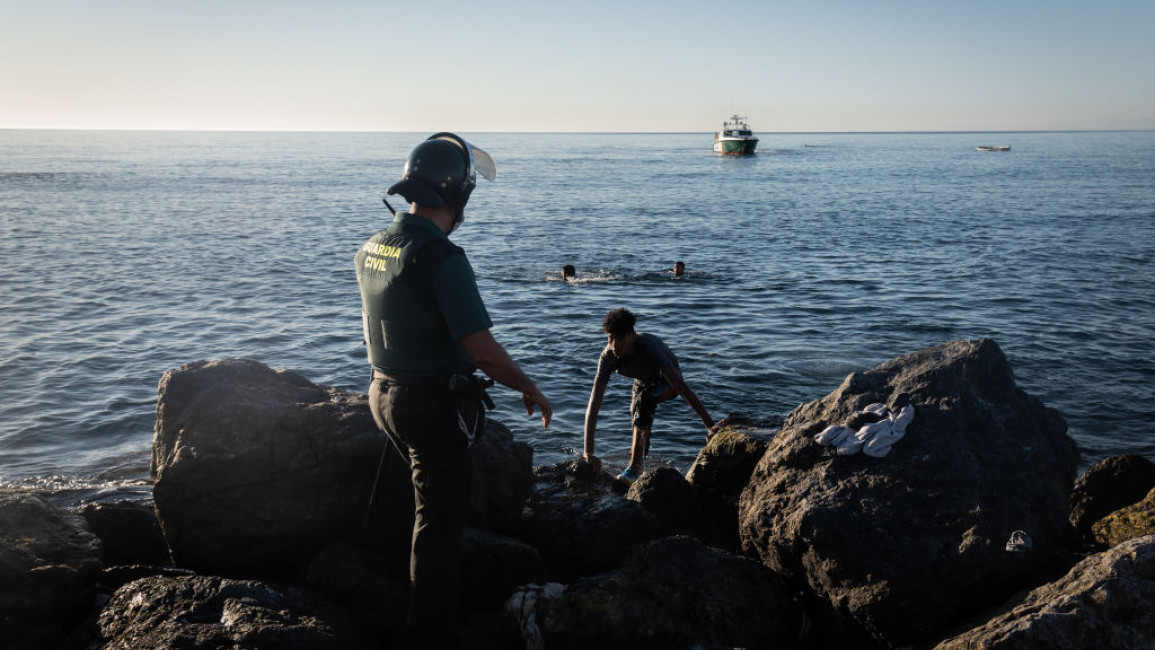In Morocco, hundreds of desperate young people ready to risk it all to swim to Spain
In Morocco, tens of thousands of young people head north each summer—not to bask on sandy beaches, but to cross them to the other side: Europe.
As the early morning sun in Fnideq, near Tangier, barely warms the sand, a group of twenty-something men gather for a football game, pausing often to chat about friends who vanished on 25 August—the day 1,500 people swam from Morocco's Fnideq to Ceuta, a tiny Spanish enclave on the Mediterranean.
The swim across the Strait of Gibraltar is only six kilometres, but not everyone makes it.
"I keep checking my phone, hoping not to see news of one of my friends' bodies washing ashore," says Adil, a young man from Tangier, halting the game to express his fear.
Over the weekend, Spanish media broadcast videos showing police intercepting migrants in the water at night amid thick fog, and even in broad daylight, struggling to separate new arrivals from crowds of beach goers in Ceuta.
Since 22 August, an average of 700 people have attempted to breach the border daily, Cristina Pérez, the Spanish government's representative in Ceuta, told journalists on Monday. She did not disclose how many had successfully reached the enclave.
Meanwhile, on the sands of Fnideq beach, several young men are plotting their escape before summer ends—a perfect time for those who can't afford a place on a migrant boat and prefer to swim, hoping to blend in with beach goers on the other side.
"Some people think we're lazy or troublemakers, but that's not true," says Mourad, a 25-year-old from Tetouan, determined to leave the country by "any means" this year. "I have a bachelor's degree in Arabic literature, but I still couldn't find a job," he adds. The unemployment rate in Morocco rose to 13% in the fourth quarter of 2023.
Under the shade of a tea stall, a group of teenagers relaxes, escaping the heat. Their chatter is less serious, more romanticising the migration journey. However, when asked about the risk of dying on the way, a heavy silence falls over them.
"I lost several family members and friends in the earthquake, and those of us who survived…we're barely living," interrupts Hassan, an 18-year-old who travelled from Asni, a region near Marrakech devastated by last year's deadly quake. A year after losing his school and family's house, he sees no prospect of staying in the country.
Every corner of Morocco's northern beaches hums with conversations or songs about leaving the country. It's nothing new, but experts argue that the recent migration mania is tightly linked to the government's "failing policies."
"What's happening is primarily the result of the complete failure of public policies and government institutions. (...) It's an expression of the lack of trust in the state," says Khalid Mona, a Moroccan expert in anthropology and migration.
In February, residents of the nearby Moroccan town of Belyounech attempted to swim to Ceuta after the Moroccan government began demolishing their unauthorised beachside homes to make way for new development.
Rabat has yet to address the rising migration attempts, but according to Spanish officials, it's "loyally cooperating" with Madrid to curb them.
Spain and Morocco: Deadly migration cooperation
Since the start of August, Spanish authorities have sent back to Morocco between 150 and 200 people daily. They've thanked Moroccan authorities for their "loyal cooperation."
However, the Moroccan Association of Human Rights (AMDH), a non-governmental organisation, says the process sometimes takes a "cruel and criminal form," citing a recent incident on 25 August.
On Sunday afternoon, a boat left Morocco's Nador heading towards the Spanish enclave of Melilla. It carried three men and one woman.
A widely shared video on social media shows the boat being rammed by the Guardia Civil in their territorial waters.
"It was a violent intervention. They could have stopped the boat using other methods", says Omar Naji, a member of AMDH.
In the video, it's clear that a person falls into the water at the moment of impact between the Guardia Civil boat and that of the migrants.
While Moroccan authorities claim the man was recovered and brought ashore, AMDH is sceptical. "We suspect that the fourth person may have died, but we're not sure," says Naji.
According to AMDH, the survivors were handed over to the Moroccan maritime gendarmerie at sea. "For us, this is an illegal action. Normally, they should have brought them ashore and given them the opportunity to apply for asylum."
To uncover the truth, AMDH is calling for an investigation on the Spanish side. An investigation has already been opened by Moroccan authorities.
Morocco has long refused to play the role of "immigration gendarmes to protect the European border," in the words of Moroccan Foreign Minister Nasser Bourita.
However, things have changed since March 2022, when Madrid shifted policy and supported Morocco's plan for autonomy in the disputed territory of Western Sahara—a vital diplomatic file for Rabat.
In June 2022, Moroccan and Spanish police killed 23 migrants on the Melilla border amid a massive crossing attempt orchestrated by over 2,000 migrants, mostly from sub-Saharan Africa.
Morocco's state-backed Council of Human Rights (CNDH) said the migrants were armed with stones and hooks and injured more than 140 Moroccan officers during the "clashes."
After a six-month investigation, the Spanish judiciary closed the case without further action. Morocco, meanwhile, sentenced around fifteen migrants to prison for "illegal entry" and "damage to public property."




 Follow the Middle East's top stories in English at The New Arab on Google News
Follow the Middle East's top stories in English at The New Arab on Google News
![The US vetoed a UN Security Council (UNSC) resolution demanding a ceasefire in Gaza [Getty]](/sites/default/files/styles/image_330x185/public/2185152251.jpeg?h=7ef8ac04&itok=RpLSj2pu)

![An attack by paramilitary forces in Sudan has killed at least 40 people [Getty]](/sites/default/files/styles/image_330x185/public/2182364341.jpeg?h=a5f2f23a&itok=r8Fkhxdj)